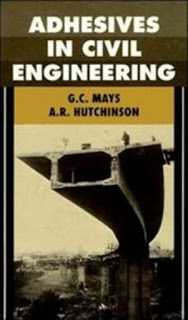This book provides a complete and clear introduction to the use of adhesives to form load-bearing joints in bridges, civil engineering and building structures.
Recent advances in adhesive technology have led to a rapid growth in the use of adhesives in load-bearing joints in civil engineering applications such as buildings and bridges. In many cases, the use of adhesives can prove more convenient, less expensive, stronger and more durable than traditional method of joining.
 |
| Download Free book on Adhesives in Civil Engineering by G.C. Mays and A.R. Hutchinson |
The first part of this book address the crucial factors involved in the formation of a successful adhesive joint, including adhesive selection, surface preparation, joint design, fabrication and protection from the environment.
About the Book
\”In many cases, the use of adhesives can prove more convenient\”
The second part of the book describes the growing uses of adhesives to repair and strengthen existing structures, the growing uses of adhesives to repair and strengthen existing structures, in addition to describing their use in new construction and applications which are now being developed for the future.
The book gives the reader all the information required to fully exploit the economic and technical advantages of adhesives.
Professional civil and structural engineers in higher education and industry will find this book an invaluable source of information on a technology increasing importance.
The book will also be useful to graduate students of construction.
Title of the Book
Adhesives in Civil Engineering
Author of the Book
G.C. Mays
Head of civil engineering Group
Cranfield Institute of Technology
Royal Military College of science
A.R. Hutchinson
Deputy head of joining technology Research Center,
School of Engineering
Oxford Polytechnic
Contents of the Book
Part 1
Adhesive and Adhesion
Chapter # 1 : Introduction
Chapter # 2 : Adhesive classification and properties
Chapter # 3: Adhesion and surface pretreatement
Chapter # 4: Adhesive joints
Chapter # 5: Specifications, fabrication and quality control
Chapter #6 Application in repair and strengthening
Chapter # 7: Applications in new construction
Chapter # 8: Potential future developments
@import url(http://fonts.googleapis.com/css?family=Oswald:700);
Download the Book
The Content is for Members Only !!!
This Book is available to download for our free members, you can simply click the button below to signup / login for your free membership and download the book now.
Download this Book For free

















